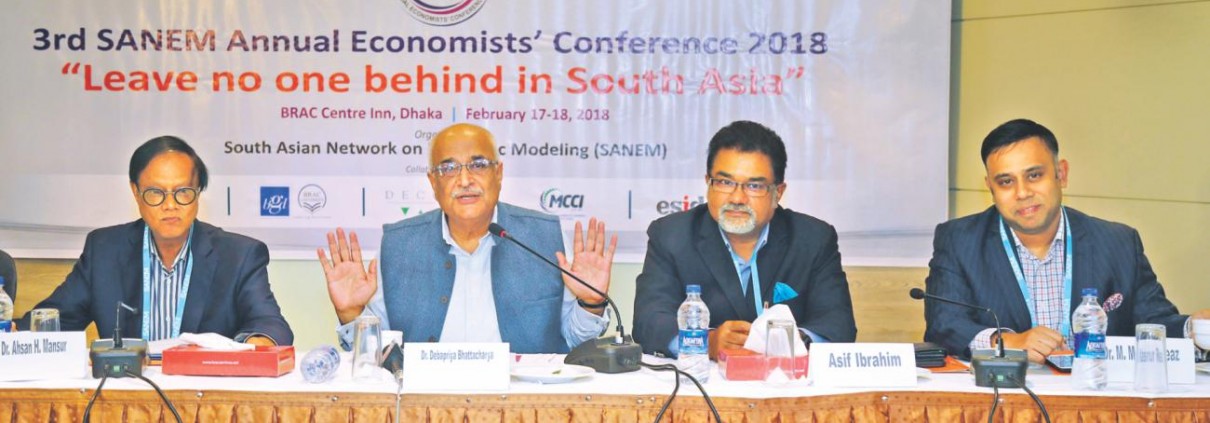Fix private sector’s problems to achieve SDGs: experts
Fix private sector’s problems to achieve SDGs: experts
From left, Ahsan H Mansur, executive director of the Policy Research Institute of Bangladesh, Debapriya Bhattacharya, distinguished fellow at the Centre for Policy Dialogue, Asif Ibrahim, vice chairman of Newage Group, and M Masrur Reaz, senior economist in the Trade & Competitiveness Global Practice of the World Bank Group, are seen at the 3rd SANEM Annual Economists’ Conference 2018 at Brac Centre Inn in the capital yesterday. Photo: Star
Bangladesh will not be able to achieve the Sustainable Develop-ment Goals within the 2030 deadline without addressing challenges confronting the private sector, experts said yesterday. The country’s private sector is facing problems ranging from sluggish infrastructure investment, lack of skilled human resources to the energy crisis, unplanned urbanisation, and industrial pollution.
The 17 goals of the SDGs will not be achieved by 2030 if the government and the entrepreneurs do not take up the issues properly, according to the experts. “There is no structure in the country to arrange a discussion between the policymakers and the businesses of the private sector on how to solve the existing challenges,” said Debapriya Bhattacharya, a distinguished fellow at the Centre for Policy Dialogue. The authorities should give importance on resolving the issues in order to implement the SDGs, said Ahsan H Mansur, executive director of the Policy Research Institute of Bangladesh.
They spoke at a session titled “Reforms Need to Facilitate Private Sector Engagement for SDGs Achievement in Bangladesh” at the SANEM Annual Economists’ Conference 2018 at the Brac Centre Inn in Dhaka.
Bhattacharya said the required reforms in line with the SDGs are not being carried out as expected in absence of a discussion structure. “Inclusive development is not possible without discussions. A structure should be developed by ensuring the participation of the private sector.” The entrepreneurs should also come forward to implement the SDGs, he said. Mansur said the SDGs are closely aligned with Bangladesh’s development goals.
The desires comprise problems of environmental pleasant (climate change, pollution, and biodiversity loss and deforestation) and sustained financial resilience (improving get right of entry to to sustainable energy resource, building sustainable cities and advertising of sustained economic growth), he said. The former economist of the International Monetary Fund said Bangladesh has mostly neglected infrastructure investment. Bangladesh’s public investment in infrastructure is 2 percentage of the gross domestic product, lagging in the back of the regional competitors.
In China and Vietnam, public quarter infrastructure funding has exceeded 7 percent of GDP, Mansur said.
According to Mansur, a burning trouble facing Bangladesh today is the growing shortage of herbal gasoline as recent data advise the modern reserves are possibly to be depleted in much less than 10 years. He advised the industrial zone to enlarge fuel use efficiency.
Mansur also stated when you consider that most industries are located on the banks of the country’s major rivers, industrial pollution is a serious chance to water quality. two Land grabbing by politically linked people also contributes to the unplanned development and waterlogging, he said.
M Masrur Reaz, a senior economist at the World Bank Group, stated Bangladesh is capable of the usage of only 35 percentage of the international value chain due to the fact of inefficiency. He said the country’s important export incomes is coming from its ordinary garment sector. Bangladesh have to produce varied export-oriented objects and find out new markets to advantage the most from the world fee chain, he said.
Reaz recommended the policymakers focal point on growing a expert body of workers and the usage of the modern-day technologies to boost export earnings. He stated an enlarge in the waft of overseas direct funding is relatively necessary to diversify exports. “The functionality of the neighborhood businesses can also be improved if overseas investors select the u . s . to make investment,” he said. Asif Ibrahim, vice chairman of Newage Group of Industries, and Habibullah N Karim, managing director of Technohaven Company Ltd, additionally spoke.


Leave a Reply
Want to join the discussion?Feel free to contribute!